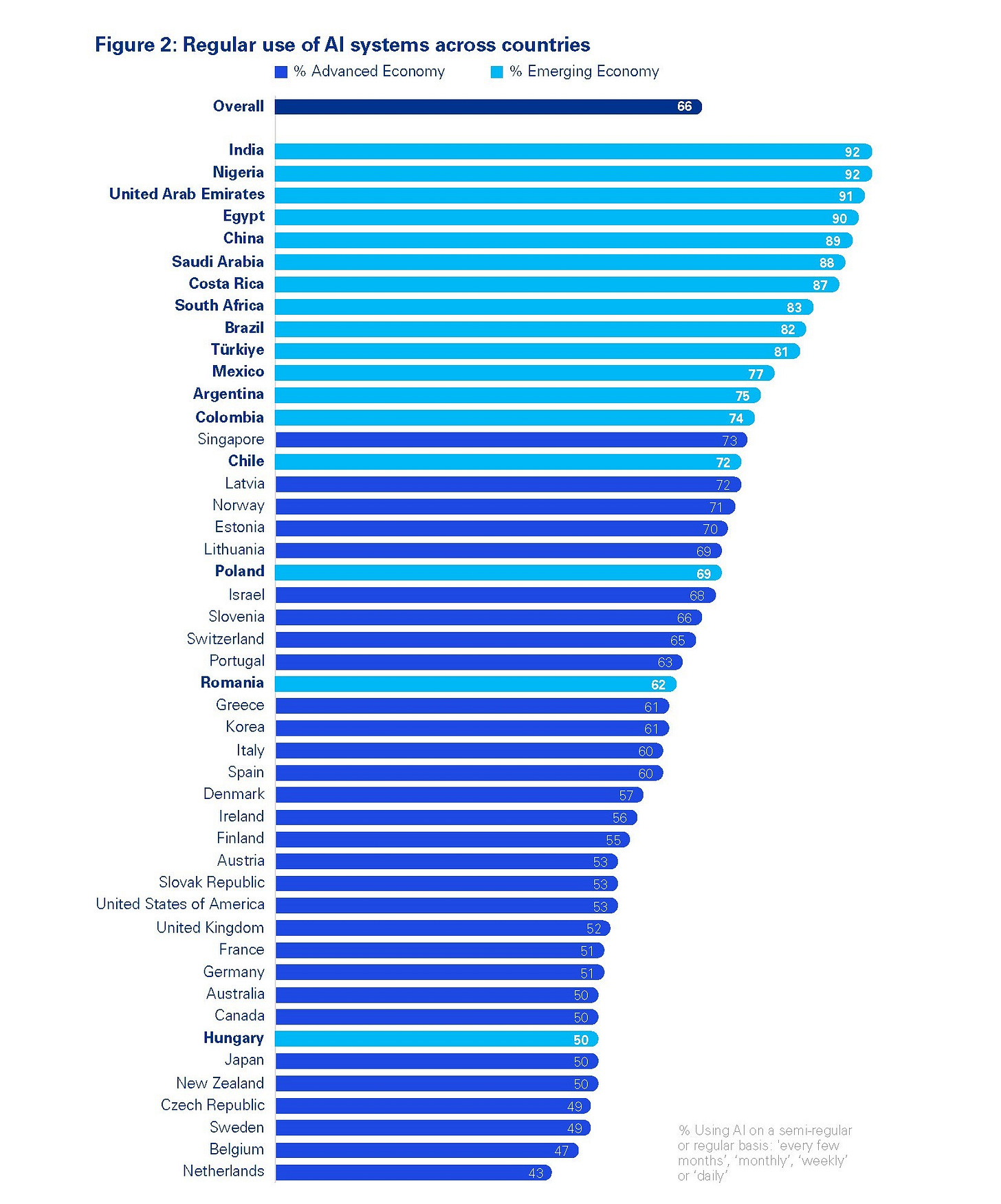Future-Proofing Congress: Six institutional wins to mark six months of the 119th Congress
Congress isn’t the only legislature making moves to improve internal operations.
And just like that, it was summer. Everyone I’ve met with recently on the Hill seems to have Capitol-fever — the cabin-fever equivalent of pining to get out of DC for a much needed break…ideally by a large body of water with a much deserved beverage. These first six months of the 119th Congress have been nonstop and, as the news cycle usually goes, there is a lot of talk about what hasn’t been done versus what has. Although it's not in the scope of this newsletter to cover policy-related activities, there have been a number of institution-boosting wins worth reflecting on (and celebrating!) as Congress does its not-so-slow roll into summertime. To name a few:
The continuation of the Committee on House Administration’s Subcommittee on Modernization and Innovation. This bipartisan subcommittee represents a commitment by House leadership to ensure that Member-driven improvements to the internal operations of the House continue to be a focus — an essential mission in helping Congress become future-proofed.
The continued investment in innovative and productivity-boosting technology, particularly the tools under development for House Members and staff by the CAO and House Digital Service.
Student loans in the House were expanded as part of the new House Retention through Educational Advancement Program (REAP), allowing for reimbursement of education types such as educational and professional development expenses, as well as professional credentialing and licensure.
Improvements to the Capitol Campus, elevating the operations and experience for Members, staff, and the public. This includes the laudable achievement of officially establishing an ADA-accessible drop off zone for visitors to the Capitol Complex, the remodel of Longworth HOB’s café space, and the expansion of staff-only bipartisan coworking space across the HOBs.
House and Senate offices’ continued exploration with use of GenAI (in compliance with chamber-issued guidance)
The House’s work with the Office of Whistleblower Ombuds to approve use of secure whistleblower intake tools and the use of Signal, supporting offices’ and committees’ abilities to confidentially work with whistleblowers.
These changes don’t just happen. Each took dedicated Members, staff, institutional offices, time, and resources to come to fruition, but now they are established and benefiting the Capitol community. As the next six months fly by, our team at POPVOX Foundation is here to support — and encourage! — each and every House and Senate staffer in being agents for change in supporting the continued institutional health of our legislature. As the title of this newsletter declares, we believe in a Future-Proofed Congress! But often, initiating the changes needed and diligently keeping that work going over a Congressional cycle feels like eating an elephant. If you feel intimidated, remember: you’re not in it alone. It is in the power of every Member and staffer to foster innovation in their own workflow or explore a modern approach to how you do things. Don’t settle for being a donkey or an elephant, be a unicorn.
Also in this month’s newsletter:
Stay safe out there
International governments are enjoying having a Copilot
GenAI tools custom-built for legislatures are cropping up
AI agents are no longer science fiction
International Fix: A framework for strengthening legislatures
Stay in the Game: Making water work
Warmly,
Aubrey Wilson
Director of Government Innovation
POPVOX Foundation
Stay Safe Out There
We are devastated by the politically motivated violence we’ve seen across the country over the last month. As Danielle Stewart, POPVOX Foundation’s advisor for Congressional relations, recently emphasized, the first step in keeping Members and staff safe is for them to begin taking full advantage of the resources currently available and support the creation of additional safety measures in the future. We hope that you, your team, and families take a moment to learn more about the programs, offices, and other resources at your disposal to support you — from within and outside the institution. The US Capitol Police, Sergeants at Arms, Office of Employee Assistance, and more and there for you. Here are also a few resources and safety-minded best practices to review.
International Governments are Enjoying Having a Copilot
The UK’s Department for Science, Innovation, and Technology and Government Digital Service released the findings of a 3 month study on the effects on government employee productivity when workflows were augmented with Microsoft’s 365 Copilot. 20,000 government employees across a swath of the UK government participated. The key takeaways? 70% of users agreed that use of Copilot reduced “time spent searching for information, performing mundane tasks, and increased time on more strategic activities.” 82% of participants didn’t want to go back to working without the tool. The full report can be found here, and for further exploration, the findings of a similar report and initiative undertaken by the Government of Australia is accessible here.
GenAI Tools Custom-Built for Legislatures are Cropping up
Outside organizations, civic tech companies, and universities on the state, federal, and international level are exploring use cases for how generative artificial intelligence tools can be customized for legislative use cases. Here are a couple that have caught our eye. (*Note that, to our knowledge, none have been explicitly approved for use on official devices within the US House and Senate.)
CongressionalRAG: a chatbot through which users can “chat” with US Congressionally-introduced bills, the US law code, and executive orders
BillChatAI: a chatbot through which users can query information contained in more than 6,000 legislative bills that have been introduced in the state of Montana.
StaffLink: a bot built by POPVOX Foundation that is trained to provide practical answers about Hill office protocols, constituent services, and traditions to help new staff get up to speed.
Just a note: Even if a GenAI tool isn’t custom-built for Congress, it can still be used to boost productivity in a legislative setting. For example, this training focuses on how elected officials can be more efficient and effective using commercially available LLMs and this training compares Anthropic’s Claude and OpenAI’s ChatGPT for legislative use cases. Before using any tool, ensure compliance with your institution's guidance.
AI Agents Are No Longer Science Fiction
When it comes to institutions adapting to emerging technology, everyone is at the same starting gate. In fact, huge leaps in innovation-based adoption can actually be a catalyst for substantial government advancement in developing nations or other countries around the globe. The invention of generative AI has sparked this type of technology arms race. What comes next? The Berlin Global Government Technology Centre and World Economic Forum have released a working whitepaper arguing that Agentic AI is worth keeping a close eye on.
Agentic AI refers to the creation of AI agents, technology capable of taking independent actions to achieve a goal rather without requiring direct command. Explored in the context of “the Agentic State”, the whitepaper begins a conversation about how this next paradigm shift “is not simply the automation of existing processes or the replacement of human rules with AI agents, but marks a shift in the nature of government and public administration on par with the invention of the bureaucratic state in the 19th century…”
International “Fix”- Inspiration from Parliaments Around the World: A Framework for Strengthening Legislatures
What does it take to help parliaments around the world become stronger and more effective? The Common Principles for Support to Parliaments, endorsed by nearly 80% of national parliaments, focus on letting legislatures drive their own development rather than having reforms imposed on them. ModParl’s editor, Dr. Beatriz Rey had a fascinating chat with Jonathan Lang from the Inter-Parliamentary Union that showcased how simple ideas — like making sure all political parties are included in capacity-building efforts and investing in parliamentary staff — can make a real difference in building resilient democratic institutions.
For more news from international legislatures, subscribe to our Modern Parliament (“ModParl”) newsletter.
Stay in the Game: Making Water Work
When working in Congress, staying hydrated seems to be a goal but not an often achieved reality…unless coffee counts. However, staff do drink up tons of information on a daily basis. Try word-associated drinking — pick a word that you come across often at work (i.e., amendment, representative, bill, etc.) and set a goal to take a couple sips of water each time you hear or read it.
Have a favorite self-care tip you’d like to share? Email us!
The Future is Now
How politically slanted are Large Language Models? The Polarization Research Lab has published findings (presented in an easily-digestible table) addressing this question.
The team at Every pitted a dozen commercially available AI models against one another in a game of Diplomacy. The game’s results are a mix of entertaining and incredibly insightful into how different models “think” and their “personality.”
Following the incredible honor of presenting to the National Assembly of Belize on how currently available GenAI LLMs can be used by Members of Parliament, the POPVOX Foundation team has published the training “GenAI in a Parliamentary Setting: Enhancing Productivity for Elected Officials“ as an on-demand 20-minute course.
A charming read, this New York Times article explores 22 new jobs that the use of AI could create, addressing where the human touch will be more essential than ever.
Online privacy hygiene often falls to the end of a busy to-do list, but in the era of GenAI, it’s more important than ever to preserve your cybersecurity and sanity. WIRED recently published a starter guide to help cross this item off your list.
Anthropic’s LLM, Claude, is approved for use in the Senate along with other tools such as OpenAI’s ChatGPT. How do the two compare? This video explores the LLMs similarities and differences.
DC, get ready to welcome Waymo! The selfdriving taxi company has already established itself in Austin, Phoenix, Los Angeles and San Francisco, completing an estimated 250,000 weekly trips.
About POPVOX Foundation
POPVOX Foundation is a nonpartisan nonprofit that helps democratic institutions keep pace with a rapidly changing world. Through publications, events, prototypes and technical assistance, the organization helps public servants and elected officials better serve their constituents and make better policy.






